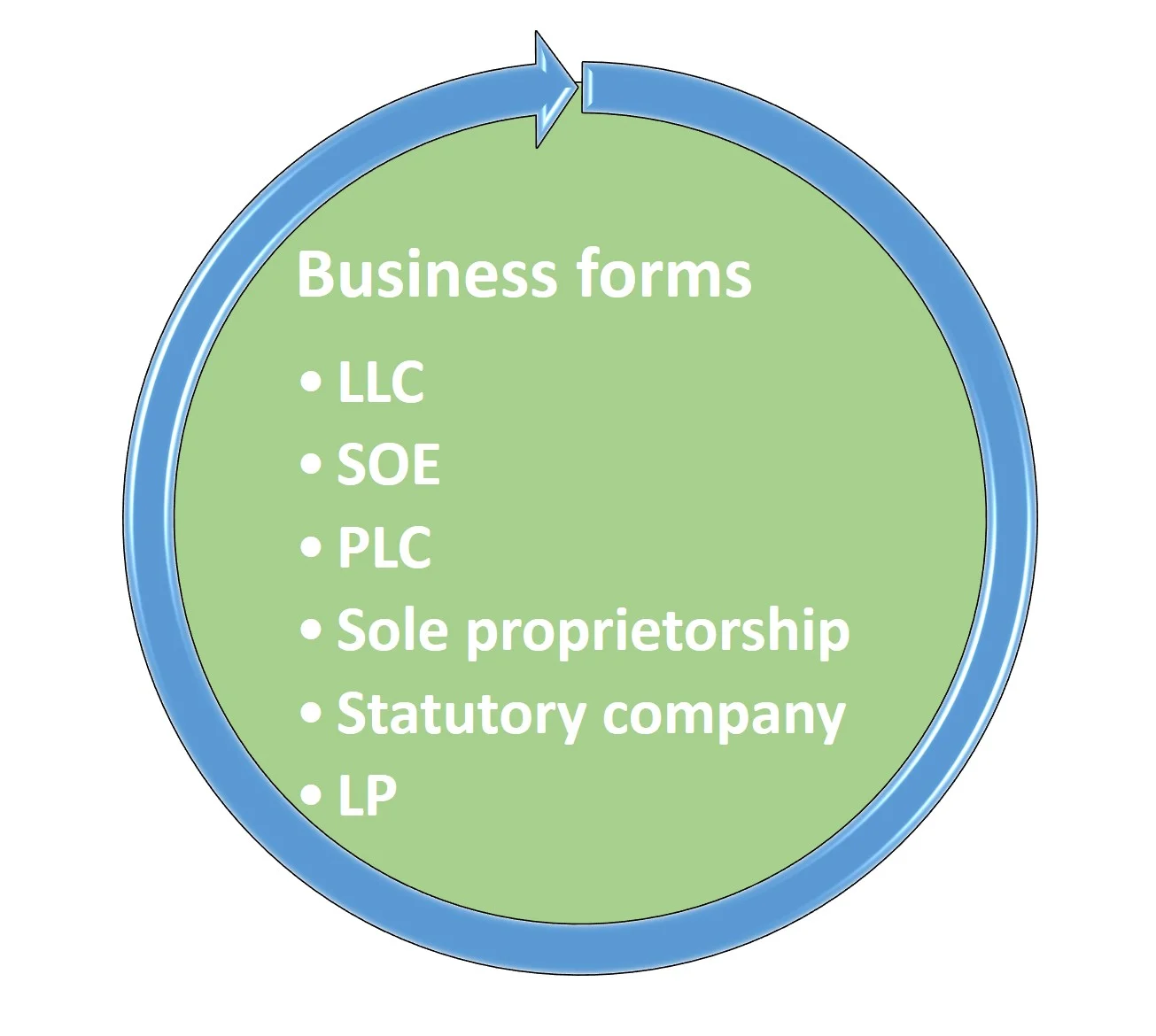A business form is an entity created and controlled under the corporate law for each country. It can be for any product, service, charitable work, or other activity. We often hear terms such as corporations, partnerships, companies limited by shares, etc. In this article, we will explore such common business forms that exist in the world.
Limited partnership (LP)
This kind comprises the general partnership and the limited partnership.
General partnership (GP): It involves two or more members that have:
- Managerial responsibilities
- Accountability for debts
- Equal profit sharing
They are subject to managing the daily affairs of the firm, controlling the limited partnership, and answering economic commitments.
Limited partnership: It is the partnership that invests in assets like real estate, where they have one or more GP and one limited partner. A limited partner has little liability and is not subject to paying off any debts that surpass his capital.
Regional variations of LP differ as per the country. It is estimated to exist 38,988 limited partners in the world.
Public limited company (PLC)
Whenever you see a company name ending with the initials PLC or plc, consider it a public limited company. This specific business form is found in the UK, the Republic of Ireland, and a few commonwealth administrations. The shares of such companies can be traded to the public, and are listed on stock exchanges. Two prerequisites are essential for these firms:
- Must have at least £50,000 capital
- Should incorporate public limited company words or PLC suffixes.
This type is similar to the publicly traded companies in the united states. As per reports, around 100,000 PLCs are functioning in the UK.

Private company limited by shares
Sometimes, we come across names like GmbH, LLC, société à responsabilité limitée, etc., with company names. It indicates private ownership of a company under a particular jurisdiction.
GmbH: Germany and Austria
LLC: The united states
société à responsabilité limitée: France
Now, let’s focus on the private company limited by shares. This particular type exists in Northern Ireland, Scotland, England, Wales, and the Republic of Ireland. The general public cannot purchase its shares, since it has limited liability shareholders. Therefore, such companies are not listed on the public stock exchange. The accountability of shareholders is limited, and their private assets remain shielded in case of bankruptcy. These shareholders have a right to vote in case of significant changes and making crucial decisions in the company.
As per reports, approximately 4 million companies in the UK are registered on the companies house public register, out of which 95% are privately limited firms by shares.
General partnership
A general partnership is established by two or more people. It has the following characteristics:
- Responsible for taxes, debts, and illegal liability
- Share profit according to the invested capital
- Control and manage the business
If a specific person carries out any activity with a third person, all other members are considered partners in his dealings. When a partnership fails, partners may lose their assets because of their unlimited liability.
If you want to understand how particular business functions, read the top 3 business models to watch out for.
Statutory corporation
These business forms are government entities established by law to serve a regulatory purpose. Countries like India, Germany, Hong Kong, Australia, the UK, the USA, etc., have statutory corporations. Refer to the below features of such corporations operating in India.
- Different legal existence
- Own procedures and policies as per the state legislation scope
- Flexible functionality
- Funded by state or central government
- Less government intervention
- Provide better services to the public
Food Corporation of India (FCI), State Bank of India (SBI), and Life Insurance Corporation (LIC) are a few popular corporations in India.
State-owned enterprise (SOE)
It is a government entity formed by the provincial or national government to:
- Supply products and services to the public at affordable rates
- Obtain profit for the government
- Achieve economic objectives and advancement goals
SOEs exist in the United States, China, South Africa, Norway, and New Zealand. The worldwide value of SOEs is estimated to be 45 trillion. These are known as public sector undertakings in India. There are a total of 365 PSUs in India with a capital investment of Rs. 16.41 lakh crore.
Holding company
As the name suggests, a holding company holds stocks in other companies. It is also called the parent company that owns an interest in its subsidiaries. This kind does not sell or manufacture products and services. It can, however, oversee management decisions and control policies.
Holding firms can hold assets such as real estate, stocks, patents, etc. It is not subject to any penalty or remuneration if the subsidiary goes bankrupt.
Berkshire Hathaway is one of the most well-known holding companies in the world. Currently, JPMorgan Chase & Co. tops this list.
Subsidiary company
As previously stated, subsidiary companies carry out all the business activities owned by the holding company or parent organization. It can be the SOE or the government. The subsidiary must follow local laws whenever a parent company owns a subsidiary in a foreign country. Subsidiaries, however, remain legal entities separate from their parent companies, reflecting their independence of liability and taxation.
The US owns the most subsidiaries in the world. Vinci is the biggest subsidiary.
Sole proprietorship
Typically, it is a one-person enterprise. He owns everything and can employ people to work for him. As the proprietor owns all of the business’s assets, he or she is also responsible for all of the business’s debts. The sole trader receives all profits and is liable for losses and debts to an unlimited extent. It is permissible for sole proprietors to use a trading name or business name other than their legal name.
The united states have over 23 million operating sole proprietorships making it the most typical and popular business form.
Limited liability company (LLC)
These are business forms in the united states that shield their owners from personal liability. It blends the traits of a corporation and a partnership or sole proprietorship. Having limited liability means that the assets and debts of a company remain separate from the owner’s assets and debts. LLC laws can vary as per the state. It has become a suitable business option due to the following:
- Members are protected from debts.
- Less paperwork
- No double taxation
- Company profits are taxed individually
Currently, 21.6 million LLCs are operating in the US. PepsiCo Inc., Exxon Mobil Corp., and Johnson & Johnson are a few examples of LLCs.
If you want to learn more about the business forms, let us know in the comment section.




[…] (Strength): Features of a specific team or business form that give it benefits over other competitor industries. It can include people, technology, […]
[…] Learn about different kinds of business at 10 types of common business forms in the world. […]
[…] to our article, 10 types of common business forms in the world to know about business […]
[…] can be found in all aspects of our lives, such as smart homes, smart cities, healthcare industries, businesses, entertainment industries, and transportation systems (self-driving cars). It can standardize how […]
[…] computing has revolutionized the way businesses and organizations handle data and applications. By using cloud-based services, businesses can […]
[…] If you are interested to know different types of businesses, read our article 10 types of common business forms in the world. […]